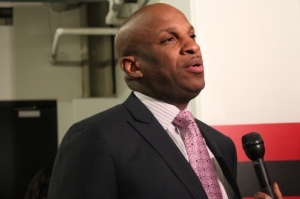Ga. Man Sues State for Denying Him 'GAYGUY' License Plate
A Georgia man has filed a lawsuit against the state for denying him a vanity license plate that advocates a pro-gay lifestyle.
James Cyrus Gilbert of Atlanta is suing Robert G. Mickell, the commissioner of the Georgia Department of Driver Services, for allegedly violating his constitutional rights by not approving the vanity plates 4GAYLIB, GAYPWR and GAYGUY, which were filed by Gilbert on Jan. 2.
"It's not like I was asking for something that was vulgar or over the top," Gilbert, who is being represented by two free-speech lawyers, Cynthia Counts and Gerry Weber, told the Atlanta-Journal Constitution.
"Denying someone the right to put 'gay' on their tag, that's political. If I want I could get a tag that said 'straight man,' but because it had 'gay' on it, it's not available," Gilbert, 30, added.
Gilbert is reportedly filing the lawsuit with the hopes that his vanity license plate will be approved and that the Department of Driver Services' method for approving vanity plates will be declared unconstitutional.
Additionally, the plaintiff is seeking nominal damages and recovery of attorney fees.
According to the Georgia state license plate application, state residents may apply for a "prestige license plate" for an extra fee, which provides sufficient financial benefits to the state, but the license plate may not convey any message which "may adversely affect public safety or is offensive, profane, or defamatory in nature."
According to the lawsuit, the three options Gilbert chose for his plate are on the state "bad tag" license list.
As a Department of Revenue spokesperson Vicki Lambert previously told the Atlanta-Journal Constitution, she believes the method for approving vanity license plates in the state has been inconsistent, as she believes it is impossible for employees to remain completely neutral when faced with tricky judgment calls each week.
Additionally, the law allowing prestige plates in the state was first enacted in 1968, and social perspectives have evidently changed since then.
Past vanity plate approvals do not necessarily favor any one religious or social group, however.
A previous article by the Atlanta-Journal Constitution reveals a review which showed the apparent inconsistency of the state's license plate approval methods.
For example, of the state's 10,214 banned tags and the 91,151 accepted tags, G0DROKS, G0DWH0, ILUVGUNS, GAYPWR and FEMM have all been deemed unsuitable by the State Department of Revenue employees, but G0D4EVR, GUNLUV, GAYGAY and FEMFTAL have been approved.
The Georgia Attorney General Sam Olens reportedly has declined to comment on the lawsuit.
Other states have also encountered similar issues with their vanity license plate system.
In Dec. 2012, for example, a North Carolina judge ruled that the state may only issue pro-life themed license plates if it offers the alternative pro-choice license plate option as well.
In Jan. 2012, the Indiana Bureau of Motor Vehicles angered some pro-family groups by approving license plates which benefitted pro-gay youth organizations.
























